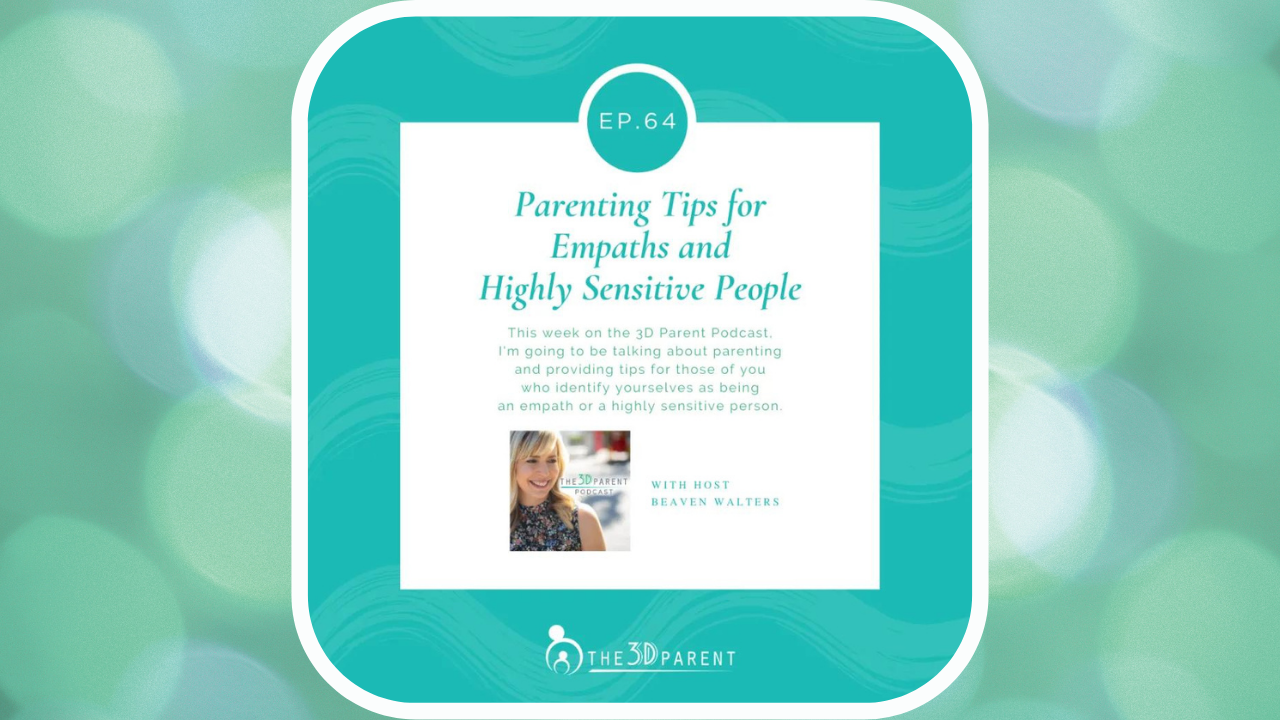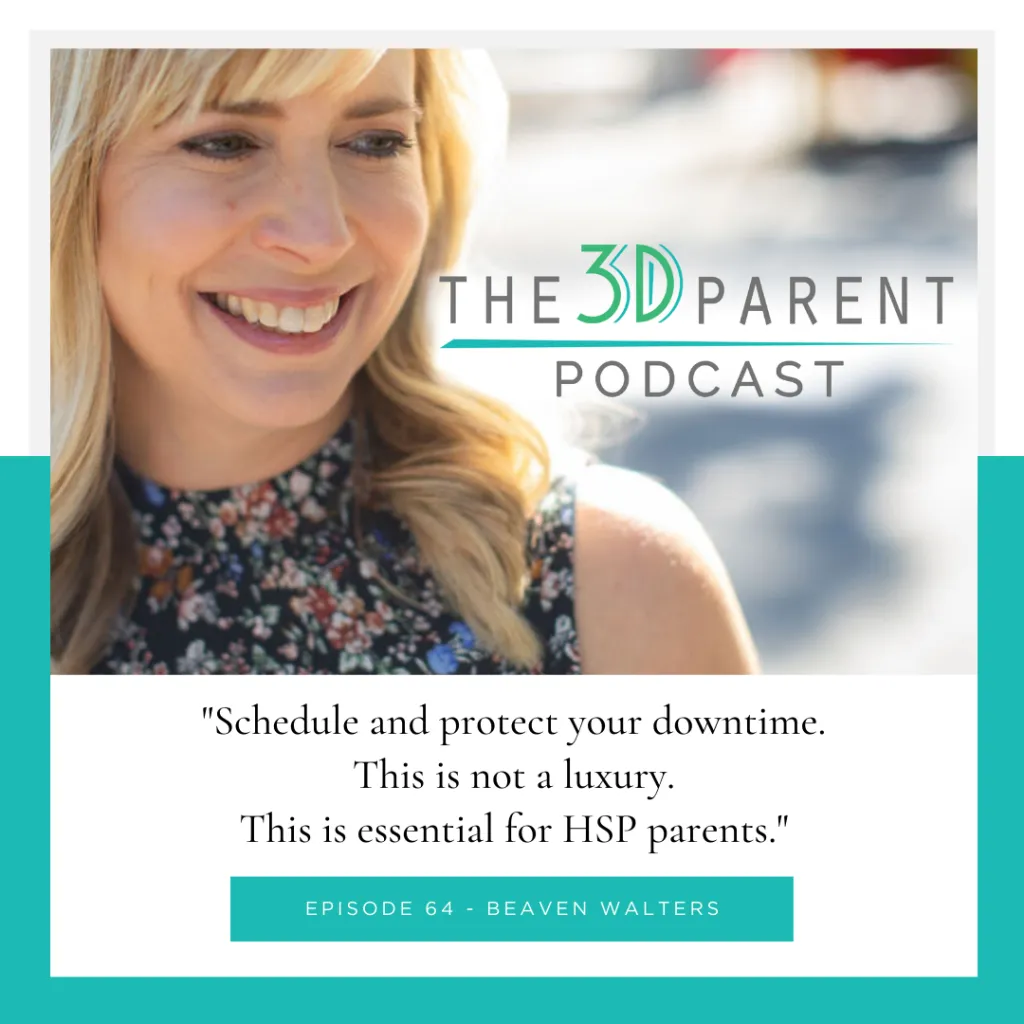[00:06] We all know that parenting comes with many joys and challenges, but for highly sensitive people and empaths, some of these challenges can feel completely overwhelming. I’m defining Highly Sensitive People, or HSPs for short as people who have sensory processing sensitivity and about 15-20% of the population fits into this category. This is not the same as Sensory Processing Disorder or SPD which is a diagnosable condition, but rather a natural variance in human temperament, although there can be an overlap between HSP and people with SPD in the ways in which they experience the world. If you identify yourself as an HSP or empath, I completely relate. I would describe myself this way, and especially in my earlier years of parenting, I would sometimes feel so overwhelmed that I joined my children in their tantrums. Over time, I developed coping strategies that worked for me, and I hope the tips I’ll share today can provide some relief for anyone who feels overwhelmed, HSP or not. [To learn more about managing highly sensitive children, check out Episode 23: Parenting the Highly Sensitive “Orchid” Child.
[04:50] First, I want to talk about the common challenges for highly sensitive people and empaths as parents. The first struggle is taking on our children’s emotions as our own. We are all deeply connected to our children. That allows us to form strong parental bonds with them, but it can be very difficult for HSPs to maintain a sense of a separate self.
[06:40] A second struggle is that HSPs can become extremely overwhelmed with sensory input. There’s a lot of sensory experiences that come with the territory of parenting: sounds, smells, and touch, and all of this stimulation is hard for HSPs to process.
[7:59] Another common challenge is that as HSPs we are more likely to “lose our mix” and overreact emotionally. What I mean by “mix” is our ability to integrate a range of emotions, which is a key factor of emotional maturity. Sometimes the emotion just takes over and blows things out of proportion. We may be more likely to yell, lash out, or break down when things get to be too much.
[09:47] Emotional exhaustion and chronic stress are other challenges. We can burn out really quickly because of the weight of all the emotions we carry. Unfortunately, this can have negative effects on our physical and emotional health. And this can lead to relational problems in our parenting. However, there are things we can do to better take care of ourselves and our families. I’m going to give you five tips for managing your parenting as an HSP or empath.
[11:12] The first tip is to recognize that being highly sensitive is a gift. HSP parents are more attuned to the needs of others. Because of that, we are better able to decode behaviors and recognize what’s at the root of our children’s struggles. We can also be more empathetic to the struggles our children are facing. All of these things are a tremendous gift! Sometimes in my coaching practice, working with clients who are not as attuned to needs, there can be a lot of frustration in getting to the root issues. In some ways, you really do have it easier than the rest of the parents who don’t have a natural ability for attunement to needs.
[13:50] The second tip is to adopt healthy stress releases and make them a regular part of your life so that you can complete what’s called the stress response cycle. I was first introduced to this idea in an episode from Brene Brown’s Podcast, Unlocking Us. She interviewed Dr. Emily Nagoski and Dr. Amelia Nagoski, sisters who wrote a book called Burnout: The Secret for Unlocking the Stress Cycle. The stress cycle starts when something triggers a stress response when we go into “fight, flight, or freeze.” The cycle is meant to have a beginning, middle, and end, but what often happens, especially for HSPs is that we get caught in the cycle. We stay in a mode of chronic stress and never complete the cycle.
[16:22] We all need to be intentional about completing the stress cycle. The good news is that there are several things we can do to complete this cycle and release the energy that might be causing chronic stress and emotional exhaustion. Here are some things you can do:
- Physical exercise: This is the most efficient thing you can do. This would include things like walking, dance, or yoga to help you release energy.
- Breathing: This is the quickest and most gentle way to help yourself. You can take deep breaths throughout the day and also set aside some time to practice breathing through yoga and meditation.
- Laughing: This can be through watching something funny or finding another outlet that helps you laugh.
- Physical affection: There’s actually been a lot of research on the “20-second hug.” This kind of embrace calms you and regulates you.
- Crying: A lot of us are probably used to suppressing urges to cry, but it’s important to give ourselves some space for this. It can be very cathartic and freeing.
- Creative expression: This can be through art, dance, music, or anything else you like.
[24:28] My third tip is to schedule and protect your downtime. So often as parents we are busy taking care of others and neglect ourselves. You may see downtime as a luxury, but it’s not. Recognize this as an essential time for you to recharge and reflect. And don’t count your sleep as downtime. This needs to be a space for you to regulate your emotions.
[25:56] My fourth tip is to create a mantra that can help you when you feel triggered. This is an internal mantra to say to yourself when you feel stressed. I created one for myself in my earlier years of parenting. I would tell myself, “It’s okay for my child to have a meltdown right now, but I am not going to join them.” Saying this to myself helped me keep my emotions in check. I would recommend you use this to keep to your intention of staying calm.
[28:08] My fifth tip is to visualize a bubble between yourself and your child when they are having a meltdown. This is not about protecting yourself from your child. It’s more about envisioning that barrier that does in fact exist. You and your child are not the same people, so visualizing a bubble that helps your hold on to yourself and your emotions in the face of a lot of external stimulation can help you stay present to your child who needs help without joining into their emotional roller coaster yourself.
[29:59] I hope that something I’ve said today resonates with you. I would suggest picking one thing and putting it into regular practice. See if anything changes for you when you use this. With healthy skills in place, you will come to see your sensitivity as a gift and will be better able to manage your and your child’s emotions.











